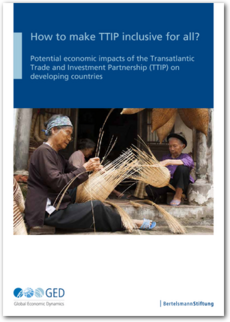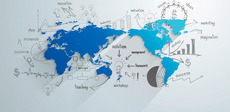Potential economic impacts of the Transatlantic Trade and Investment Partnership (TTIP) on developing countries
Bertelsmann Stiftung (Hrsg.)
Prof. Gabriel Felbermayr, PhD (ifo & LMU München), Dr. Rahel Aichele (ifo München)
How to make TTIP inclusive for all?
- Ausgabeart
- Erscheinungstermin
- 14.09.2015
- Auflage
- 1. Auflage
Format
-
PDF
Preis
kostenlos
Beschreibung
Since the creation of the World Trade Organization (WTO) in 1995, the rules of world trade have not changed. They do not account for the fact that the nature of international division of labor is no longer the one that prevailed during the negotiations in the Uruguay Round which led to the WTO (1986-1994). At that time, the geopolitical situation was entirely different than today’s: the Soviet Union still existed, and the acronym “BRICS” was still unknown. Since then, the opening up of emerging markets such as China, both unilaterally and through its accession
to the WTO, and other unilateral steps towards trade liberalization in many other developing countries, plus the arrival of modern information and communication technology, have changed the global economy. Countries no longer exchange final goods and raw materials with each other. Now, trade happens along global production chains: many firms in many different countries contribute towards the production of final goods by supplying parts and components, various services, and the final assembly. Goods are no longer made in one country for export, but they are made in the world for the world.


 >
>


